Decision making under uncertainty in relation to the pandemic was discussed by Åsa Knaggård in May 2020 (in Swedish).
A discussion about using probability to quantify uncertainty
On August 19th 2020 Ullrika moderated a discussion seminar about what it means to use precise probability to quantify epistemic uncertainty with applications on scientific assessments. This was a seminar in an online series at the Liverpool Institute for Risk and Uncertainty. https://riskinstitute.uk/riskinstituteonline/
A pdf of the presentation is available here
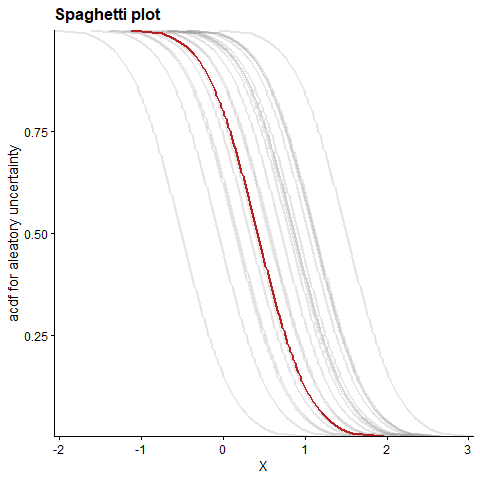
A recording of the three hour long seminar is on Youtube.
Link https://youtu.be/0qqPRN2wtIs
ForskarFredag2020
Forskarfredag är en del av European Researchers Night och infaller i år den 27 november (https://forskarfredag.se/arrangor/information-om-forskarfredag-2020/). Här finns möjlighet att presentera sin forskning. Organisationen bakom ForskarFredag heter Vetenskap och Allmänhet. På grund av det rådande läget, planerar man för flera digitala aktiviteter. Vi än grupp av forskare och kommunikatörer som vill stimulera samarbete kring aktiviteter under ForskarFredag. Bland annat vill vi ha minifilmer med forskare för att skapa virtuella aktiviteter. Instruktioner till forskare finns här (länk till pdf): Instructions_to_researchersForskarFredag2020
Forskarfredag (Researchers Friday) is part of the European Researchers night falls on November 27th (https://forskarfredag.se/researchers-night/). This is an opportunity to present your research. The organisation behind ForskarFredag is Vetenskap och Allmänhet (Science and the Public). Due to the current situation, they encourage us to plan digital activities. We are a group of researchers and communicators that would like to stimulate joint activities at ForskarFredag. We are searching for short movies with researchers to create virtual activities. Instructions can be found here (link to pdf): Instructions_to_researchersForskarFredag2020
Uncertainty at ECORISK2050
On June 30th 2020 I gave a MOOC lecture at the ECORISK 2050 training network about How to become a master of being uncertain in scientific assessments. My intention was to talk about the need to consider and communicate uncertainty in scientific assessments of risk and create a curiosity to know more.
Some recommendations to become a master of being uncertain and help out on future risk assessments:
- Acknowledge that you are always uncertain
- Gain an understanding of concepts of uncertainty
- Separate uncertainty as a concept from how you express it
- Critically evaluate how uncertainty is being treated today
- Learn Bayesian inference
- Learn several methods to deal with uncertainty
- Study scientific literature on the communication and visualisation of uncertainty
To illustrate the distinction between aleatory and epistemic uncertainty for the same outcome space : 1, 2, 3, 4, 5 and 6, we produced these GIFs (click and they will move). You are welcome to use them
Ullrika Sahlin
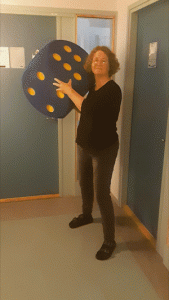
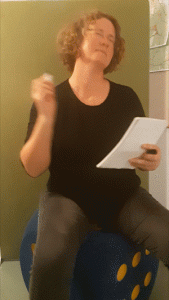
RISKUT – a conference for us teaching risk
RISKUT is a conference organised by the Swedish society for risk sciences (Riskkollegiet). This year (2020) it will be held online on September 22nd. The conference is held in Swedish. In 2021 we plan to have it in English.
Check out the call and info at this link (including a wrap up from last years program)
Program
09.00 Välkommen
Risk på distans – Göran Bengtsson, professor emeritus vid Lunds universitet
Högriskläkemedel inom barnsjukvården – Per Nydert, Karolinska universitetssjukhuset
Att undervisa om betingade sannolikheter – Johan Bring, Statisticon.
Vilket perspektiv på risk passar en pandemi? – Ullrika Sahlin, biträdande lektor vid Lunds universitet
Rollspel som verktyg i riskkurser? – Mattias Lantz, Uppsala universitet.
ca 11.00 Lärdomar från en pågående pandemi – diskussion med inbjudna gäster om behov av utbildning på risk för att möta nuvarande och framtida risker samt hur vi kan använda pandemin i undervisning.
Avslut
Välkommen att registrera dig här.
See you there
Ullrika Sahlin – on behalf of Riskkollegiet
Welcome to a workshop about using Rmarkdown to generate reports
On September 9th 2020 we will host a workshop about using Rmarkdown to generate reports. This is a highly applicable tool that can generate reports saved in various formats such as pdf, html, word or latex – even with references – from the R interface.
The workshop is free and registration is required. Sign up here (link to Skåne UserR group).
We welcome graduate students at undergraduate to graduate levels who wants to get introduced into using Rmarkdown. It is useful to have some experience in R, but it is not necessary.
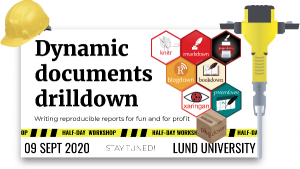 This workshop with the exiting name “Dynamic documents drilldown: writing reproducible reports for fun and for profit” will occur Wednesday, September 9, 2020, 12:00-16:00 at the Ecology Building, Sölvegatan 37, at Lund University.
This workshop with the exiting name “Dynamic documents drilldown: writing reproducible reports for fun and for profit” will occur Wednesday, September 9, 2020, 12:00-16:00 at the Ecology Building, Sölvegatan 37, at Lund University.
It is hosted by Dmytro Perepolkin and Ullrika Sahlin (centre of environmental and climate research).
Congratulations to Ivette for a successful mid-term PhD seminar
Robust analysis of uncertainty in scientific assessments
This was the topic of the mid-term seminar for PhD student Ivette Raices Cruz (PhD student in Environmental Science at Lund University) on May 26th.Abstract
Knowledge is always limited, and therefore is honest to communicate uncertainty when presenting scientific conclusions in scientific assessments. In her PhD project, Ivette Raices Cruz is studying the possibility to use robust Bayesian analysis to treat uncertainty in scientific assessments. Both Bayesian and Robust Bayesian analysis are useful to quantity uncertainty when making inference from data and experts. Ivette work is a contribution to evidence synthesis and quantitative risk assessment, by developing the methodology for Robust Bayesian analysis, and applying and comparing different ways to quantify uncertainty on existing assessment.
What happened
Ivette started with an overview of her PhD project. After that the midterm opponent, Jukka Ranta, from University of Helsinki and Finnish Food Authority, asked questions and made reflections on the topic. The seminar was on zoom and as you can see, Ivette kept the distance.
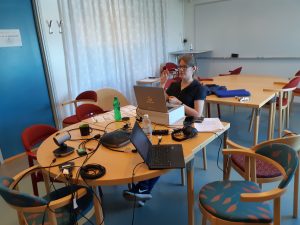 Department representative is Pål Axel Ohlsson, Department of Biology
Department representative is Pål Axel Ohlsson, Department of Biology
Main supervisor is Ullrika Sahlin, Centre of Environmental and Climate Research
Visualisation of COVID-19 risk perception data
Researchers at the Winton Centre for Risk and Evidence Communication have published a study comparing people’s attitudes towards the risk of coronavirus, and their governments’ reactions (link to study DOI). The study compare risk perception in ten countries around the world.
This data is publicly available. We have made a visualisation of the data, including data collected after the first survey round. At this point, eleven countries are included (Australia, China, Germany, Spain, UK, Italy, Japan, South Korea, Mexico, Sweden and the US). In this visualisation, we combine responses from surveys repeated over time in the same country.
Link to visualisation in English
Link to visualisation in Swedish
The purpose of the visualisation is to make it easier to get an overview of information in data and we let data speak for itself.
We have also done a summary of the Swedish data, where we compare the responses collected in March and April.
Link to visualisation of Swedish data (in Swedish)
Contact: Ullrika.Sahlin@cec.lu.se
The visualisation was made by Dmytro Perepolkin PhD student at Lund University
Book seminar – Risks and decisions for conservation and environmental management
Join us when we pick up the tradition to read the complete book by Mark Burgman “Risks and Decisions for Conservation and Environmental Management”. This is an excellent book introducing a lot of useful concepts and thinking about modelling of risk and uncertainty and provide relevant methods for supporting decision making. A good starter that is worth reading many times. Suitable for PhD students in environmental science. We will meet (online) at two occasions (end of May and beginning of June) and present chapters to each other. Dates and distribution of chapters will be decided when we know who wants to attend.
Contact Ullrika Sahlin if you want to join (before May 19).
Bayesian Evidence Synthesis at SETAC Dublin 2020
This year at European SETAC conference, Ullrika dropped the news that Bayesian Evidence Synthesis can, not only embed the quantitative uncertainty analysis where uncertainty is expressed by subjective probability, but also merge the traditions of treating uncertainty in Evidence-Based Decision Making and Quantitative Risk Assessment. The talk recorded for SETAC 2020 Dublin can be found here
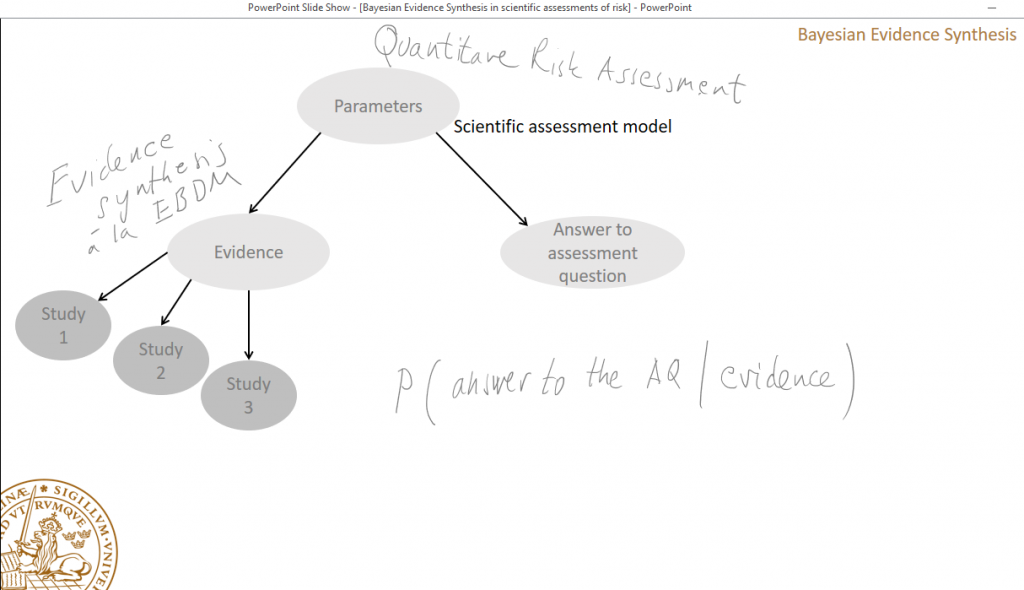

Comments